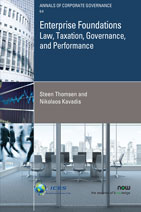Enterprise Foundations: Law, Taxation, Governance, and Performance
By Steen Thomsen, Center for Corporate Governance, Copenhagen Business School and ECGI, Denmark, st.ccg@cbs.dk | Nikolaos Kavadis, Center for Corporate Governance, Copenhagen Business School, Denmark, nk.ccg@cbs.dk
Abstract
Enterprise foundations are foundations, which own companies. While this structure is little known outside Northern Europe, a number of leading global companies such as Robert Bosch, Rolex, Carlsberg, Hershey, Ikea, the Wallenberg sphere or the Tata Group are ultimately owned by foundations. Aside from their economic significance, enterprise foundations have interesting governance characteristics including long-term ownership, the absence of a personal profit motive and the combination of business and philanthropy. Recently, they have attracted attention as a safeguard for a company purpose. In this monograph, we review the limited, but growing literature on the topic focusing on law, taxation, governance, and performance. We conclude by considering policy implications and avenues for research.
Enterprise Foundations: Law, Taxation, Governance, and Performance
Enterprise Foundations: Law, Taxation, Governance, and Performance reviews the emerging literature on enterprise foundations. After an introduction, the authors begin by defining an enterprise foundation and its essential characteristics (Section 2). The monograph then discusses relevant theoretical perspectives on foundation ownership including agency theory, contract failure, and game theory (Section 3). Sections 4 and 5 examine enterprise foundation law and tax law respectively. Section 6 reviews the financial and social performance of foundation-owned companies. Section 7 addresses enterprise foundation governance. Section 8 concludes with a summary of findings and some ideas for future research.
